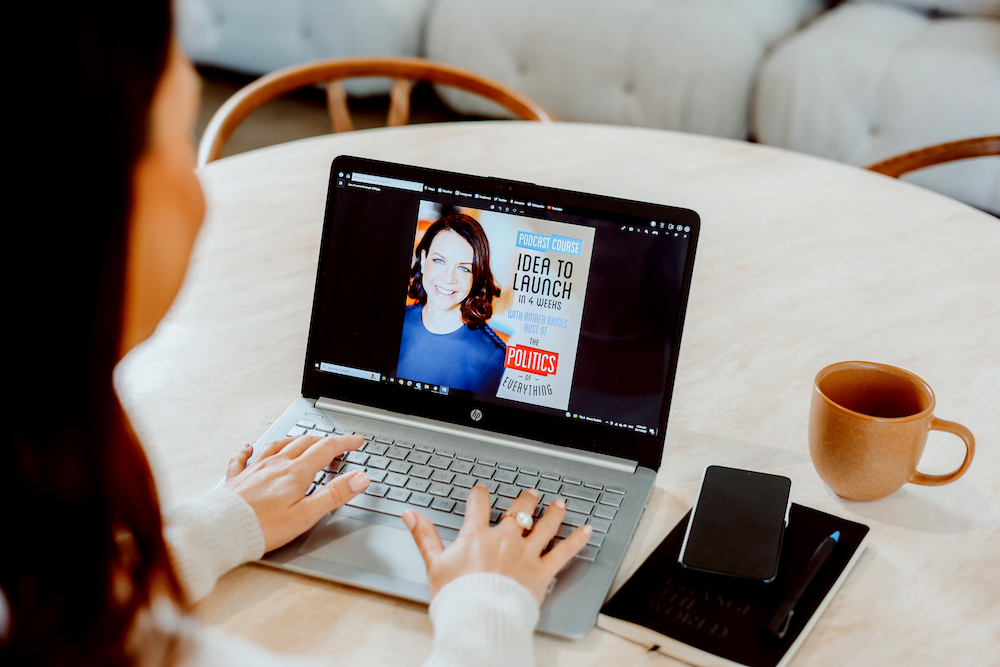Amber's Blog
Expert Ideas, Tools & Musings

Explaining Podcast ROI
Amber Daines | 1 June, 2023Every podcaster has that moment when things go from super exciting (usually preparation for launch day) to this being more complicated than expected (I’d say episode 12 for many new podcasters, based on a casual chat recently among my course cohort). It can feel hard to know WHY you are even podcasting if your metrics are not what you dreamed of, right?
Here is a short explainer to break down the metrics that matter for your podcast to get sponsors, build a community, or secure future award gongs.
The numbers game
Have you heard people talking about their podcast downloads, unique listeners, streams, and plays and wondered what it all means?
Download numbers are an obsession for podcasters and advertisers. Unfortunately, how they’re measured isn’t perfect (something advertisers like to bring up when you run a network).
Despite this, they’re improving, and the best way to look at your statistics is by comparing your success over time.
I get it! It’s a motivational boost to know that your show is performing better than someone else’s, but download numbers are often a lot lower than most people think they are – and that’s OK!
What measures matter most?
Most podcasters are better off focusing on their trends and downloads over time and improving those. My show started with under 20 downloads per episode in 2017. Still, historically, some of my older episodes have enjoyed 350,000 plus downloads because we know audiences don’t always listen to the podcast the day it drops.
Check your RSS Feeds
The data inside your podcast host is pulled from your RSS feed, so wherever your show is played or downloaded, it’s registered in the analytics section of your podcast host. Looking at your podcast stats can be helpful to see an overview of all the places your show is being listened to and the total number of listens.
Suppose you want more granular information about how people interact with your podcast, including consumption data. In that case, you can look inside the dashboards of individual directories like Spotify, Apple Podcasts, and Google Podcasts.
It’s essential to note podcast hosts measure things slightly differently, although hosts who are “IAB version x compliant” or “IAB version x certified” are relatively comparable.
If ‘IAB’ means nothing to you, don’t worry. Just know it’s best to go with a host that’s IAB certified; otherwise, your numbers could be overreported.
Downloads are not everything
You might be thinking, is that a typo? Some podcast apps download a podcast automatically, while others only download it when you press play (often referred to as ‘streaming,’ but it’s a ‘user-initiated download’). For now, most podcast hosts register these two things as the same thing (IAB-compliant hosts will only count the ‘play’ if 60 seconds of the file was played/downloaded). This means there are limitations to this measurement because most people don’t listen to every episode downloaded to their phone, but these still count as a listen whether the content has been consumed or not. Apple Podcasts also stops downloading podcasts if you stop listening to them. Still, many other apps download them forever, meaning download figures on those platforms will appear bigger than they are.
Podcasters are also reluctant to release their stats publicly (unless they’re good), so it’s hard to know what downloads other shows in your niche are getting. When using your analytics to measure success, the best thing to do is to look at your listening and audience trends over time.
As the podcast industry is becoming more standardised, you’ll eventually feel the consequences if you’re with a podcast host that isn’t accurately reporting. If you’ve told advertisers you’re pulling in a certain number of downloads, you shift to an IAB-certified podcast host, or your podcast host decides to adhere to the regulations, you might notice a drop in your downloads. That can be, at best, a real blow to the ego and, at worst, a difficult conversation with sponsors or advertisers as they realise they have paid money for downloads that didn’t exist.
Is the ‘unique podcast listeners’ statistic accurate?
This number will sometimes be referred to in the back end of your podcast host as ‘unique listeners’ or ‘total listeners.’ This number isn’t 100% accurate, but podcast hosts are getting better at triangulating the data based on IP addresses and user agents. Despite that, there are limitations to this number because if you start listening to a podcast on your home Wi-Fi, jump on the train, and then finish the ep when you get to the office, you’ll register as multiple users, which you’re not. Podcast hosts are trying their best to work out ways to prevent this kind of duplication, and they’re getting better, but it’s not a number that should be relied on.
Is your podcast audience growing?
Are people consuming the content you’re making? Note you can get more accurate data on this in directory dashboards like Google and Apple Podcasts rather than your host’s dashboard. If you’ve got a website with show notes, this can also give you valuable data about how people are interacting with the content around your show. Looking at all this data together and watching changes over time will help you make more informed decisions. Just ensure you start with a podcast host that takes measurement seriously because you want your data to be measured as accurately as possible from day one so there are no nasty surprises.
The way we measure “podcast success” is not yet 100% right, but as the industry grows and there’s greater demand for measurability, these tools will only get better. Hopefully, this has eased your worries. As we know, as a podcaster, we invest so much time, money, and energy in this podcasting game.
Final tip: Focus on the statistics you can rely on, and feel free to ignore ones you shouldn’t put as much weight on.
If you want to learn more about how I can help your podcast grow, connect with amber@ambrdaines.com or follow me on Instagram @bespokecoad for more tips and ideas.
